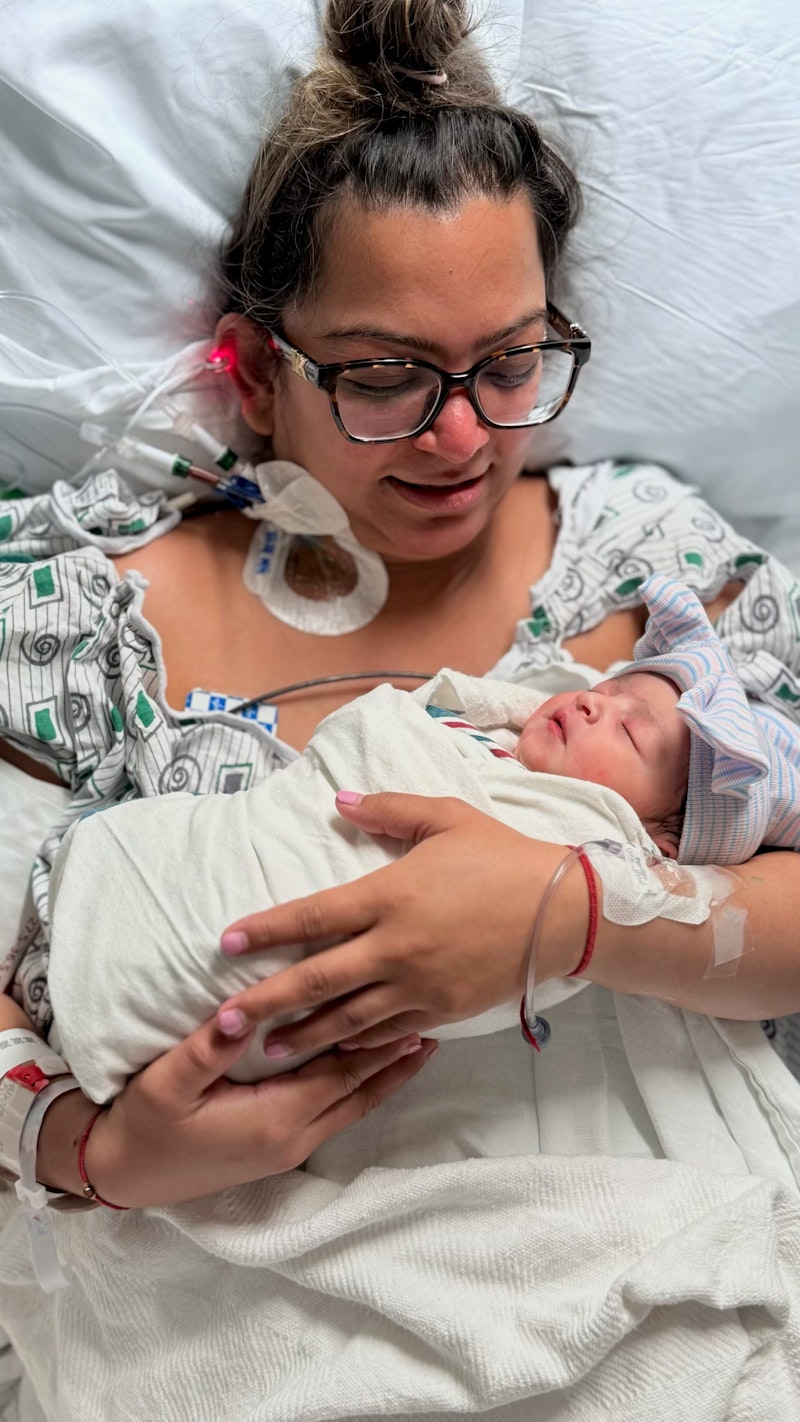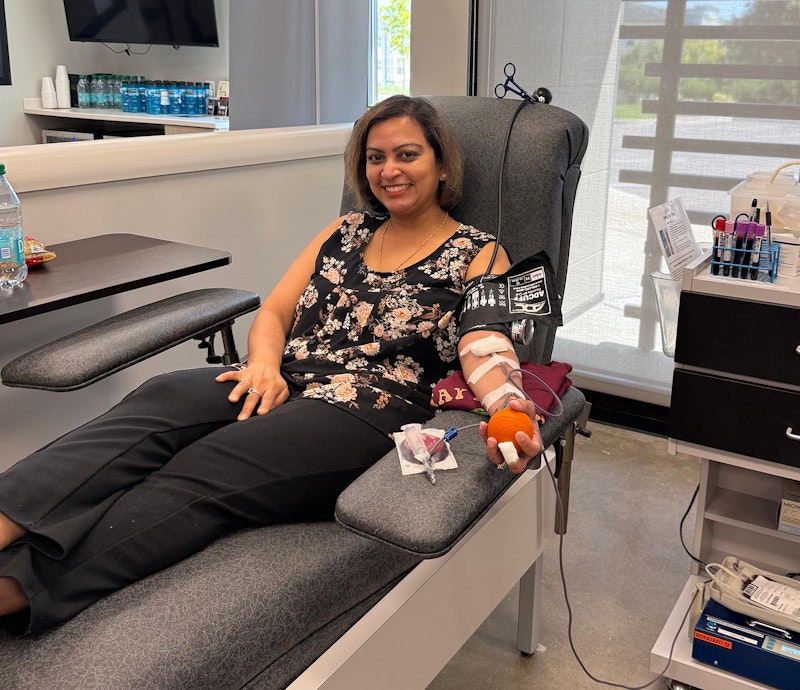Louisville Mother Survives Traumatic Childbirth Because Blood Was Available When She Needed It

Sept. 3, 2025
The moment was supposed to be one Priyanka Marfatia and her family would cherish forever.
Priyanka lay in the hospital bed with her 2-year-old daughter snuggled next to her and her husband, Jignesh Shah, bedside as they waited to welcome their second daughter into this world. For a moment, it was perfectly normal.
“Everything was very good, very calm,” Priyanka said. “The nurse even told me I could take a nap because things are looking great and everything is fine.”
Priyanka got ready to close her eyes for a little rest when everything changed.
“I turn around to lay on my side and boom, I’m bleeding,” Priyanka said.
Jignesh, a vascular neurologist, didn’t hesitate. He didn’t wait to press the emergency button, instead opened the door and yelled to the nurses’ station for help. Before Priyanka knew it, she was rushed to the operating room. What was to that point a routine pregnancy was suddenly an emergency.
“I was bleeding profusely, you know, blood clots the size of a tennis ball and everything, so they knew something was wrong,” Priyanka said.
The medical staff at Baptist Health Louisville immediately went to work to deliver the baby via cesarean section. The baby was out in moments, cleaned up and handed to Jignesh.
Jignesh noticed his wife’s blood pressure was dropping, but medical officials thought it was an error and told him he could take the newborn to the waiting room to show family while they finished closing Priyanka, who was now asleep under anesthesia.
Units of blood from the hospital blood bank were ordered to replenish what Priyanka had lost during the initial bleed and birth, but it quickly became apparent that something more serious was going on.
“They had sent one of the nurses to get it, probably like five, 10 (units), and then the other nurse went running behind her and said, ‘We’re going to need a lot more!’ ” Priyanka said.
Jignesh was FaceTiming with family when he noticed the rush of nurses with units of blood, and then the words that no one wants to hear – especially someone who works in a hospital and understands – were said over the hospital speakers: Code Blue.
“The second line was ‘Code Blue in the OR’ so I immediately realized it is about my wife,” Jignesh said. “Obviously my heart sank.”
Priyanka was in cardiac arrest. She was losing blood so quickly that her heart stopped pumping blood.
As a physician, Jignesh knew the severity of the situation.
“She was dead,” Jignesh said. “Code Blue is a person is dying. A person is dead if you don’t do anything.”
As a parent, Jignesh, holding his newborn baby with his older daughter by his side, wondered about the future of his family.
Medical staff worked quickly to resuscitate Priyanka and find out the root of the problem. Her heart rate flatlined again, but doctors and nurses brought her back both times and discovered a placental abruption had ruptured her uterus. A hysterectomy was performed to stop the bleeding.
There were a number of measures taken to keep Priyanka alive, including CPR. None of them would have mattered without the availability of lifesaving blood.
Priyanka ended up receiving 35 transfusions of packed red blood cells, platelets and cryoprecipitate, comparable to what medical officials transfuse in major traumas. It was four times the entire volume of blood in her body.
“Thirty-five people went with different things that they donated, and that’s why I made it,” Priyanka said. “If I would have gone to a rural hospital that did not possess that much blood, I would not have made it. If I would have been home, I would not have made it. But because I was at the hospital that actually had so much blood, I made it.”

From near tragedy, a miracle emerged. Seva Priyanka Shah was born, and her mother survived.
“Seva literally means selfless service to others,” Jignesh said. “Giving selfless service to others without any expectation of any return.”
It’s a fitting name for a girl whose mother remains with her thanks to the generosity of blood donors. In return, service is at the heart of Priyanka’s life now. Given a second chance, she believes it’s her mission to educate others about the importance of blood donation.
“It’s a very simple act of kindness,” Priyanka said. “It’s the best kind of donation you can make. You give blood, and your body is going to regenerate that blood.”
Priyanka had donated prior to her near-death experience, but like so many others, it was something she only did on occasion, didn’t give much thought to and hadn’t done in a while.
The experience was a lesson for her that nobody can predict when they’ll need blood. The facts are that one in 83 women will need a blood transfusion during childbirth, and one in four people will need one in their lifetime for a multitude of reasons.
Knowing the importance firsthand now, Priyanka has made a pledge to be a regular donor. In a recent visit to donate blood, Priyanka was reminded of how easy the process is.
“It was so fast,” Priyanka said. “By the time I thought about what was happening, it was done. It was very easy, and the process was very smooth. So, it is something that you can do. It is something that saves lives, there’s no question about it. It’s something that everybody must think about and do.”
About Kentucky Blood Center
KBC, the largest independent, full-service, nonprofit blood center in Kentucky, has been saving local lives since 1968. Licensed by the FDA, KBC’s sole purpose is to collect, process and distribute blood for patients in Kentucky. KBC provides services in 90 Kentucky counties and has donor centers in Lexington, Louisville, Frankfort, Pikeville, Somerset and the Tri-County area (Corbin).
